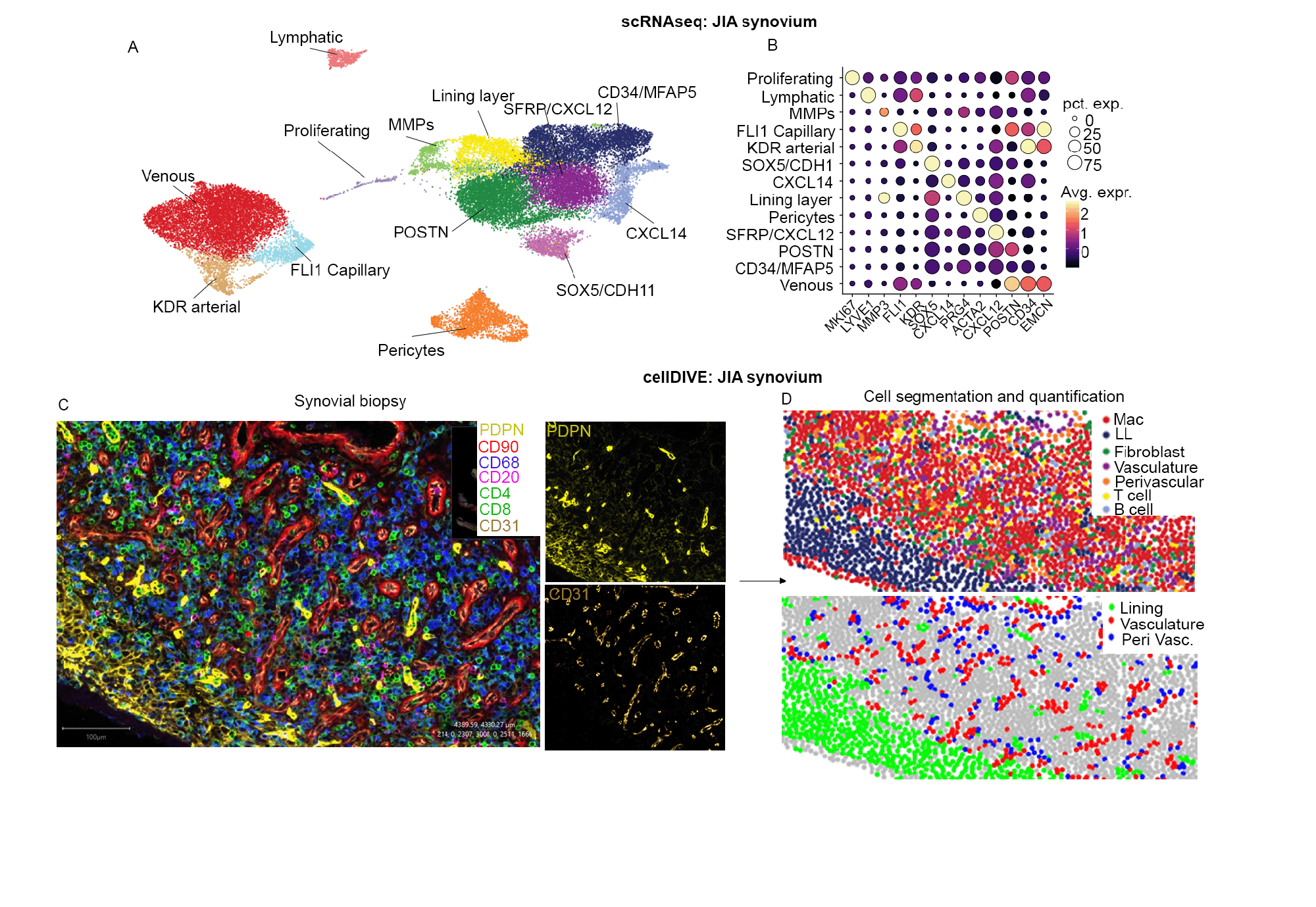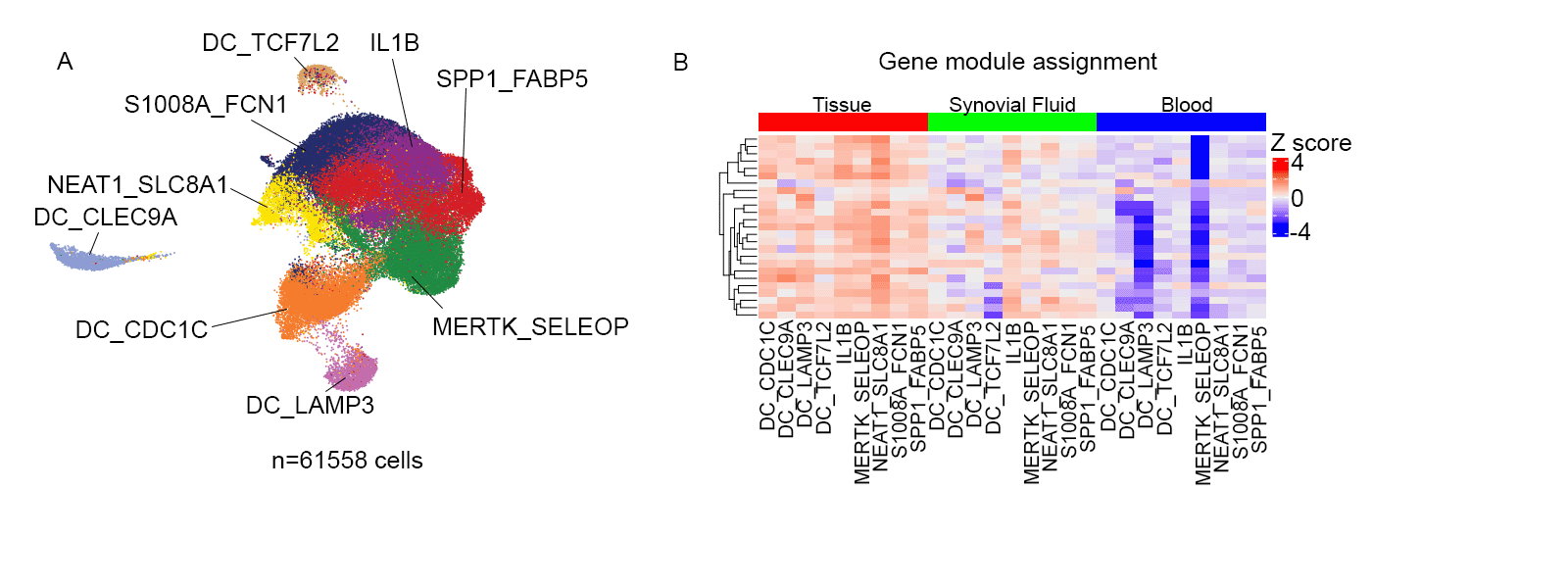Session Information
Session Type: Abstract Session
Session Time: 4:00PM-5:30PM
Background/Purpose: The synovial membrane is the primary target tissue during the effector phase of inflammatory arthritis in children and young people with Juvenile Idiopathic Arthritis (JIA). However, due to difficulties accessing synovial tissue in children, little is known of the disease mechanisms that operate locally in the synovium. As part of the UK Tissue Research in Childhood Arthritis Consortium we have generated the first single cell multiomic atlas of the inflamed synovium in JIA.
Methods: Synovial tissues were obtained from inflamed knee joints of 12 children with JIA, who were naïve to disease modifying anti-rheumatic drugs using minimally invasive ultrasound guided biopsy procedures refined for use in children. Where possible, matched synovial fluid and peripheral blood samples were obtained from the same children at the time of the procedure. Tissues were cryopreserved, thawed and disaggregated and viable cells from each sample sorted for single-cell (sc) RNAseq. Multiplex imaging of matched synovial tissue sections (GE Cell Dive) and spatial transcriptomics were performed to generate the first synovial tissue atlas of JIA.
Results: We profiled 250,816 cells from matched tissue, blood and synovial fluid samples in children with newly diagnosed JIA using scRNA sequencing. We resolved 11 major cell types, including stromal (endothelial, pericytes, fibroblasts, lymphatic) and myeloid cells. Analysis of stromal cells revealed 7 transcriptionally distinct fibroblast clusters (Fig. 1A, B). One fibroblast cluster highly expressing Sox5 and Cadherin-11 (and devoid of endothelial/pericyte/lining layer markers) was enriched in JIA synovium when compared to adult synovium of patients with rheumatoid arthritis (RA – analysis from the Accelerated Medicines Partnership (AMP) network, Zhang et al., BioRxiv, 2022). This cluster expresses several transcription factors (Fig. 1B) and ongoing neighbourhood analysis of spatial data will determine the location of these cells in synovial tissue (Fig. 1C,D). Myeloid cells were resolved into 9 clusters that are transcriptionally conserved compared to myeloid cells from adult RA inflamed synovium (AMP: Zhang et al., BioRxiv, 2022, Fig. 2A). Differential gene expression showed heterogeneity of myeloid cells between blood, tissue, and synovial fluid (Figure 2B).
Conclusion: We have generated the first single cell atlas of the inflamed synovium in children with JIA. Through a comparative analysis with adult RA synovium, we have identified a distinct fibroblast subcluster that expresses Sox5 and Cadherin-11 and is enriched in JIA synovial tissue. It is not yet known if this fibroblast subtype represents an age, developmental or disease specific transcriptional program that drives JIA pathology. Fully mapping and characterising the inflamed synovium in children is critical in understanding the cellular pathogenesis of JIA.
References: Zhang, F. et al. (2022) ‘Cellular deconstruction of inflamed synovium defines diverse inflammatory phenotypes in rheumatoid arthritis’. bioRxiv, p. 2022.02.25.481990. Available at: https://doi.org/10.1101/2022.02.25.481990
(A) scRNAseq of stromal cells and assigned clusters. (B) Dotplot of key marker genes defining stromal cell subpopulations. (C) example of multiplex cellDIVE imagines. (D) analysis cellDIVE pipeline whereby cells are segmented and fluorescence quantified.
(A) scRNAseq of myeloid cells and assigned clusters. (B) gene module assignment based on co-expression of top 10,000 highly variable genes.
To cite this abstract in AMA style:
Mahony C, Bolton C, Smith C, Alexiou V, Nguyen H, Reis-Nisa P, Lomholt S, Hackland A, Davda S, Sultan S, Foley C, Cotter C, Kupiec K, Dendrou C, Rosser E, Medicines Partnership (AMP): RA/SLE A, Zhang F, Raychaudhuri S, Brenner M, Buckley C, Thyagarajan M, RA SLE Network A, Shiekh Z, Compeyrot-Lacassagne S, Chippington S, Coles M, Al-Abadi E, Filer A, Inflammatory Arthritis (TRICIA) Consortium T, Wedderburn L, Croft A. Cellular Deconstruction of Stromal and Myeloid Cell Compartments in the Inflamed Synovium of Juvenile Idiopathic Arthritis [abstract]. Arthritis Rheumatol. 2023; 75 (suppl 9). https://acrabstracts.org/abstract/cellular-deconstruction-of-stromal-and-myeloid-cell-compartments-in-the-inflamed-synovium-of-juvenile-idiopathic-arthritis/. Accessed .« Back to ACR Convergence 2023
ACR Meeting Abstracts - https://acrabstracts.org/abstract/cellular-deconstruction-of-stromal-and-myeloid-cell-compartments-in-the-inflamed-synovium-of-juvenile-idiopathic-arthritis/


